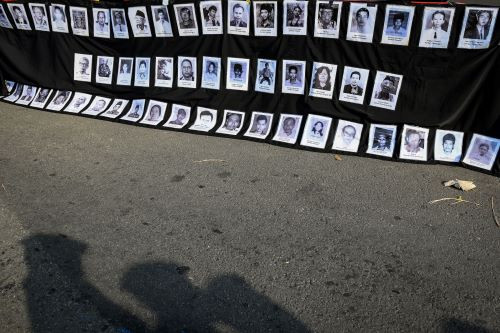Popular Reads
Top Results
Can't find what you're looking for?
View all search resultsPopular Reads
Top Results
Can't find what you're looking for?
View all search resultsStepping out of the red shadow
For decades, the red scare has been used to silence opposition, discredit progressives and stigmatize memory itself.
Change text size
Gift Premium Articles
to Anyone
 Activists of the Justice for Victims Solidarity Network partake in the Kamisan (Thursday) rally on Sept. 19, 2024 in front of the State Palace in Central Jakarta, to demand the settlement of past human rights violations, including the mass killings following the abortive coup on Sept. 30, 1985 that was blamed on the Indonesian Communist Party (PKI). (Antara/Sulthony Hasanuddin)
Activists of the Justice for Victims Solidarity Network partake in the Kamisan (Thursday) rally on Sept. 19, 2024 in front of the State Palace in Central Jakarta, to demand the settlement of past human rights violations, including the mass killings following the abortive coup on Sept. 30, 1985 that was blamed on the Indonesian Communist Party (PKI). (Antara/Sulthony Hasanuddin)
S
ixty years have passed since the events of Sept. 30, 1965; the night that ignited one of the darkest chapters in Indonesia’s history. What followed was not a simple transfer of power, but the systematic persecution, incarceration and killing of at least half a million people under the pretext of rooting out communism.
To this day, that trauma remains unresolved.
The so-called G30S movement, and the violence that engulfed the country afterward, continues to cast a long shadow.
The public conversation surrounding that period is still mired in fear, distortion and denial. As President Prabowo Subianto’s administration prepares to enter its second year, there is a renewed urgency to face this legacy head-on, not bury it further.
Recent events underscore that the red scare has not been laid to rest. Just this month, police in East and West Java raided small-scale publishers and seized books deemed “deviant”, once again invoking the specter of communist subversion as a justification.
The Commission for Missing Persons and Victims of Violence (KontraS) condemned the raids as “intellectually repressive and politically backward”. This is more than censorship. It is a chilling reminder of how easily authoritarian reflexes resurface when the state polices memory and criminalizes thought.
We must reject once and for all the idea of communism as a bogeyman trotted out to justify suppression, discredit dissent or stifle academic inquiry. It is an anti-intellectual reflex that discourages nuance, prevents open discussion and erodes trust in our institutions.
More dangerously, it has been used to justify revisionism.
The government’s ongoing project to rewrite the nation’s official history, including its account of 1965, has yet to be released to the public. But critics have raised concerns about the opaqueness of the process and the political motivations behind it.
Culture Minister Fadli Zon, who oversees the effort, has refused to openly confirm whether military responsibility for the post-1965 violence will be acknowledged, or whether the victims will even be named.
This is a cause for grave concern. If civilian supremacy is truly the hallmark of the Reform era, then the official version of history must reflect that. It cannot remain one that glorifies the rise of military power, omits atrocities and legitimizes decades of silence.
History should belong to all of us, not just those in power. And yet, state-sanctioned narratives continue to be shaped by the very forces that benefited from erasure.
In this light, the red-tagging of students, the censorship of art and the arrest of citizens for owning or publishing books appear as symptoms of a larger pattern.
In 2012, the National Commission on Human Rights (Komnas HAM) declared the 1965–1966 purge a gross violation of human rights. But to this day, there has been no meaningful truth and reconciliation process, no reparations for survivors and no formal state apology.
Former president Joko “Jokowi” Widodo briefly promised to address historical injustice, but left office with little to show for it.
Now Prabowo, a self-proclaimed history buff, has positioned himself as a unifier, promising national dignity and strength. If that promise is genuine, then his administration must stop sanitizing the past.
It must open state archives. It must create space for survivor testimony. It must support independent historical scholarship. And above all, it must treat history as something to be reckoned with.
For decades, the red scare has been used to silence opposition, discredit progressives and stigmatize memory itself. It has divided our society and robbed generations of the ability to speak openly about who we are.
The wounds of 1965 will not heal themselves. The truth will not emerge on its own. Justice will not be delivered without pressure. That is why this anniversary must not be another excuse for state propaganda or revisionism.
No history is worth telling if it is written by those who fear it most.










